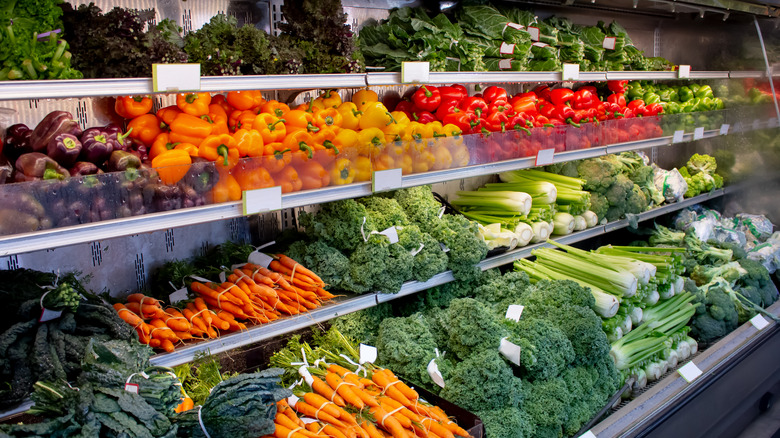What's Actually In The Mist That's Sprayed On Grocery Store Produce?
It's a magical moment: You're in the produce section of your local supermarket when suddenly, the sound of a thunderclap plays over the speakers, and a light mist begins to spray down on all of the lettuce and broccoli in front of you like a weak, hyperlocalized storm. Misting produce at regular intervals is common at grocery stores throughout the United States (and the fun sound effects are an added bonus), but if you ever really stop to think about it, the practice raises a lot of questions. For one thing, what's actually in the mist anyway?
As it turns out, there's some debate on what the answer to that question really is — and it might even vary by grocery store. But in general, it's just filtered and treated water. There may also be some antimicrobial washes or pesticides mixed in with the water in very small concentrations in order to slow bacterial growth on the fruits and vegetables and keep the water lines clean.
Theories on what's in the mist — and why
Let's get more specific: What is an antimicrobial wash, how might it be used in a mister at a grocery store, should you be concerned about the spray on your produce, and why do grocery stores mist produce anyway?
The United States Environmental Protection Agency defines a pesticide as "any substance or mixture of substances intended for preventing, destroying, repelling, or mitigating any pest." The definition of an antimicrobial pesticide leads naturally from this, being a substance that mitigates the development of microbiological organisms, or pests that are essentially invisible to the naked eye. The antimicrobial wash made by ProduceMaxx, which is used for washing produce and misting in many grocery retail brands across America, including Sprouts Farmers Market, is made with water, salt, and hypochlorous acid. Still with us? Hypochlorous acid, although created commercially for use in the food industry, is also naturally produced in humans and other mammals to help fight infections. In other words, it's safe for human consumption as long as it's at low concentrations — in fact, it's even certified to be used in cleaning organic produce.
ProduceMaxx is typically used to keep water lines clean, such as in dentists' offices, and does the same thing for the misting water lines, helping prevent them from building up mold as well as protecting the produce from bacteria. But regardless of the mist, it's still important to wash your produce because grocery stores can be much dirtier than you realize — and yes, you still have to wash organic produce (just to be safe).

